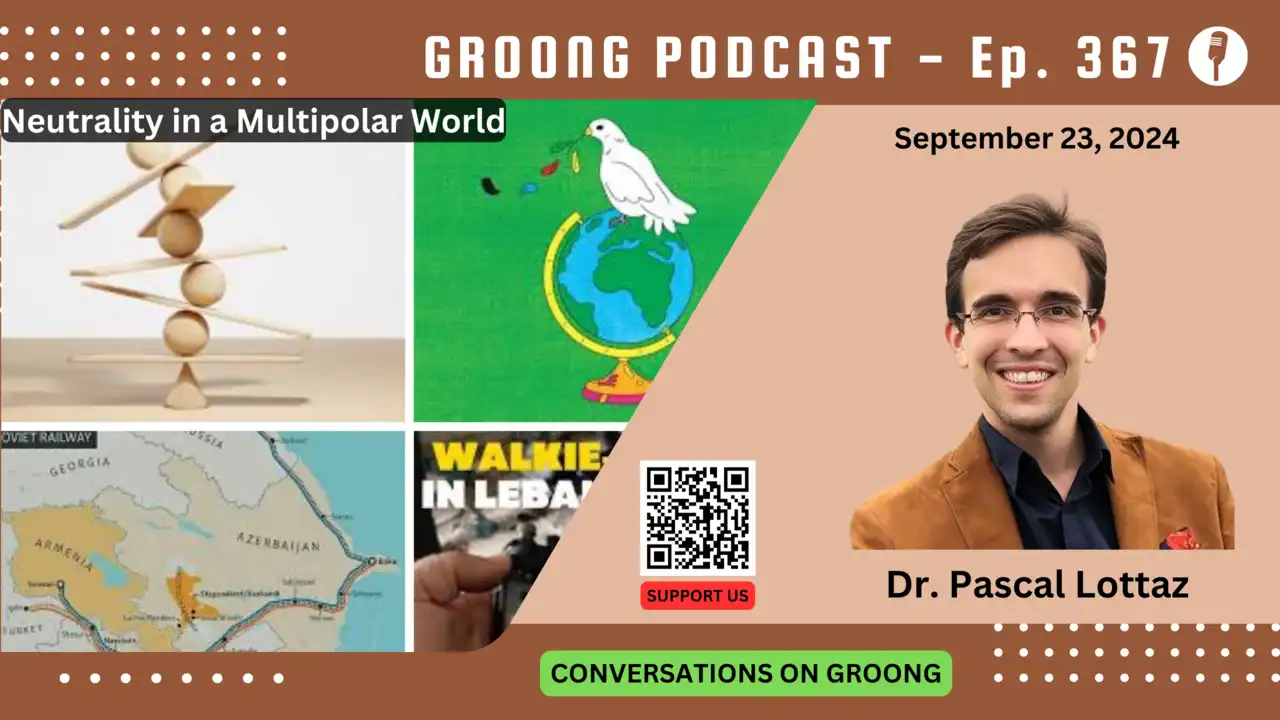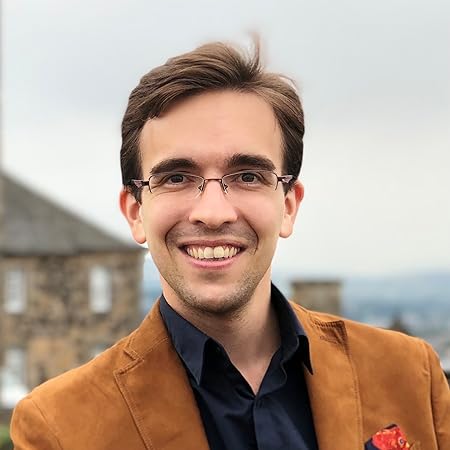Pascal Lottaz - Neutrality Studies, Armenia and the Incoming Multipolar World | Ep 367 - Sep 23, 2024 [EP367]
Posted on Tuesday, Sep 24, 2024 | Category: Armenia, Artsakh, World Order | Series: cog, video
Groong Links:
Guest:
Topics:
- What is Neutrality Studies?
- Rise of the Multi-Polar World
Episode 367 | Recorded: September 18, 2024
Show Notes
Neutrality in a Multipolar World
Neutrality Studies
Since this is your first time with us, would you tell us about yourself, and the interests that have led you to the formal study of the concept of “Neutrality”?
Your university in Japan, University of Kyoto, seems to be one of the few places around the world that has a formal neutrality studies program.
Question:
- What is neutrality and what is the theoretical basis for Neutrality Studies?
- When was the term introduced or coined?
Let’s relate to an old saying attributed to Edmond Burke, that “the only thing necessary for evil to triumph in the world is for good men to do nothing”.
- Simple Googling shows that the quote is misattributed to Burke, but the point remains the same.
Questions:
- Are you “neutral” if you sit by and watch your neighbors commit genocide?
- How is neutrality different from “independence”?
- What are your thoughts on the Non Aligned movement?
- For many years, as part of the nonaligned movement, Azerbaijan was able to gather diplomatic favor from other members of that organization. Can one argue that simply by voting with Azerbaijan, in what ended up today the ethnic cleansing of Artsakh, non-aligned states were party to Azerbaijan’s policies?
- The 2012 ministerial meeting mentioned territorial integrity and non-use of force.
- Since that meeting, subsequent resolutions or meetings seem to have focused simply on observing Azerbaijan’s territorial integrity at the detriment of all other well-known principles such as self-determination and non-use of force.
- This is perhaps the equivalent of the “Not my war” stance. But is it really “neutral”?
- For many years, as part of the nonaligned movement, Azerbaijan was able to gather diplomatic favor from other members of that organization. Can one argue that simply by voting with Azerbaijan, in what ended up today the ethnic cleansing of Artsakh, non-aligned states were party to Azerbaijan’s policies?
Specifically when it comes to international principles considered to be equal, yet within the context of specific conflicts, they are diametrically opposed. For example: territorial integrity vs. right to self-determination.
Questions:
- Where does “neutrality” stand between right and wrong?
Rise of Multipolar World
There’s a lot of talk about the rise of the multipolar world, but I haven’t seen a clear definition of what it means.
Questions:
- What does a multipolar world mean? What will be the key attributes of a multipolar world? Will there be more neutrality?
- … more or less peace?
- … more liberal or traditional values?
Small States A Multipolar World
Since we’re Armenian, let’s talk a little about Armenia. In a previous discussion, with our guest Glenn Diesen, we asked whether the Nagorno-Karabakh war was a trap set up for Russia, given what was coming in Ukraine. He said that if Russia took sides in the fighting, it would indeed be a trap.
Questions:
- Do you agree or disagree?
- What drove Russia’s policies at the time and what is driving them now?
Since then, Pashinyan has taken up the dramatic step of moving Armenia away from Russia’s orbit. Frequently playing on the emotions of the populace, who truly can’t forgive Russia’s inaction in Karabakh and since then.
NOTE: Some would point out that Pashinyan always had anti-Armenian sentiment.
This policy has been cheered by a coterie of western-funded academics. Just today, an item appeared in the National Interest, penned by Anna Ohanian and Nerses Kopalyan, with the sub-headline that says it all: “Armenia can offer the United States a foothold in Russia’s backyard.”
Just that statement itself seems to offer Armenia to be used as a tool in the fight between Russia and the West. Many of our analysts have said as much when addressing the topic.
Question:
- What is the upside of Armenia becoming a US “foothold” against Russia?
Institutions of the Multipolar World
The logic of multipolarity seems to dictate less global institutionalism and more local and regional approaches, or bilateral approaches. At least in the case of the UN and other similar organizations, we’re seeing that their role is diminishing to the point of irrelevance.
But at the same time, we’re seeing reorganizations and growth of other organizations, such as BRICS, SCC and the Eurasian Economic Union.
Questions:
- Can you tell us what is the role of BRICS and SCC? Are they geopolitical organizations or geoeconomic in nature?
- Any predictions about the upcoming BRICS summit that will take place in Kazan in October?
- There’s a lot of talk about a common BRICS currency that might be established. Can you tell us your thoughts about this?
- Or is it about purely de-dollarization and trading in local currencies?
- What institutions are still missing to support the multipolar world?
Supply Chain Security in the Multipolar World
With yesterday’s “pager attack” by Israel, a new rubicon was crossed in our opinion, in terms of what will be permissible for some countries and threats that smaller and less technically sovereign countries will need to consider.
Just briefly, it appears that Israel was able to either at manufacture time or during shipment time, implant explosives into thousands of pagers, allegedly destined for use by Hezbollah in Lebanon. Not just pagers, but it appears that some cell phones, communications radios, and even solar panels were reported to be rigged in a similar manner. There were many deaths and thousands of injuries, including innocent bystanders and even children.
Regardless of one’s stance on the conflict in the Middle East, this attack raises many questions about the security of basic technology and any other goods that countries are not self-reliant on.
We know there are only a handful of countries that can manufacture essential technologies from cell phones to networking equipment.
Questions:
- How do regular (medium and small) countries get assured that their networking equipment doesn’t have a backdoor for the NSA or that their cell phones don’t have explosives in them?
- Is there a risk to communications networks being segmented as well?
- We have an example of the Chinese Firewall and an “internet” within China that is local only to that country.
- Will Russia eventually set up its own internet?
- Is there anyone thinking how these “regional” internets will be interconnected, especially for collaboration?
- For example, will Russia allow residents in its orbit a more “privileged” access, whether it is for commerce or other types of collaboration?
Wrap-up
That’s our show! We hope you found it useful. Please find us on Social Media and follow us everywhere you get your Armenian news.
Thanks to Laura Osborn for the music on our podcasts.
Guests

Pascal Lottaz
Dr. Pascal Lottaz is an associate professor of law at the University of Kyoto, in Japan. He specializes in the study of neutrality in international relations, Geopolitics in East Asia, European Politics, Nuclear Nonproliferation, and the study of the Second World War.
Hosts

Hovik Manucharyan
Hovik Manucharyan is an information security engineer who moved from Seattle to Armenia in 2022. He co-founded the ANN/Groong podcast in 2020 and has been a contributor to Groong News since the late 1990s.
Disclaimer: The views expressed by Hovik Manucharyan on the ANN/Groong podcast are his own and do not necessarily reflect the opinions of his employer or any other organization.

Asbed Bedrossian
Asbed Bedrossian is an IT professional, and for years oversaw the central IT enterprise infrastructure and services at USC. His decades of experience spanned across IT strategy, enterprise architecture, infrastructure, cybersecurity, enterprise applications, data center operations, high performance computing, ITSM, ITPM, and more.
Asbed founded the Armenian News Network Groong circa 1989/1990, and co-founded the ANN/Groong podcast in 2020.